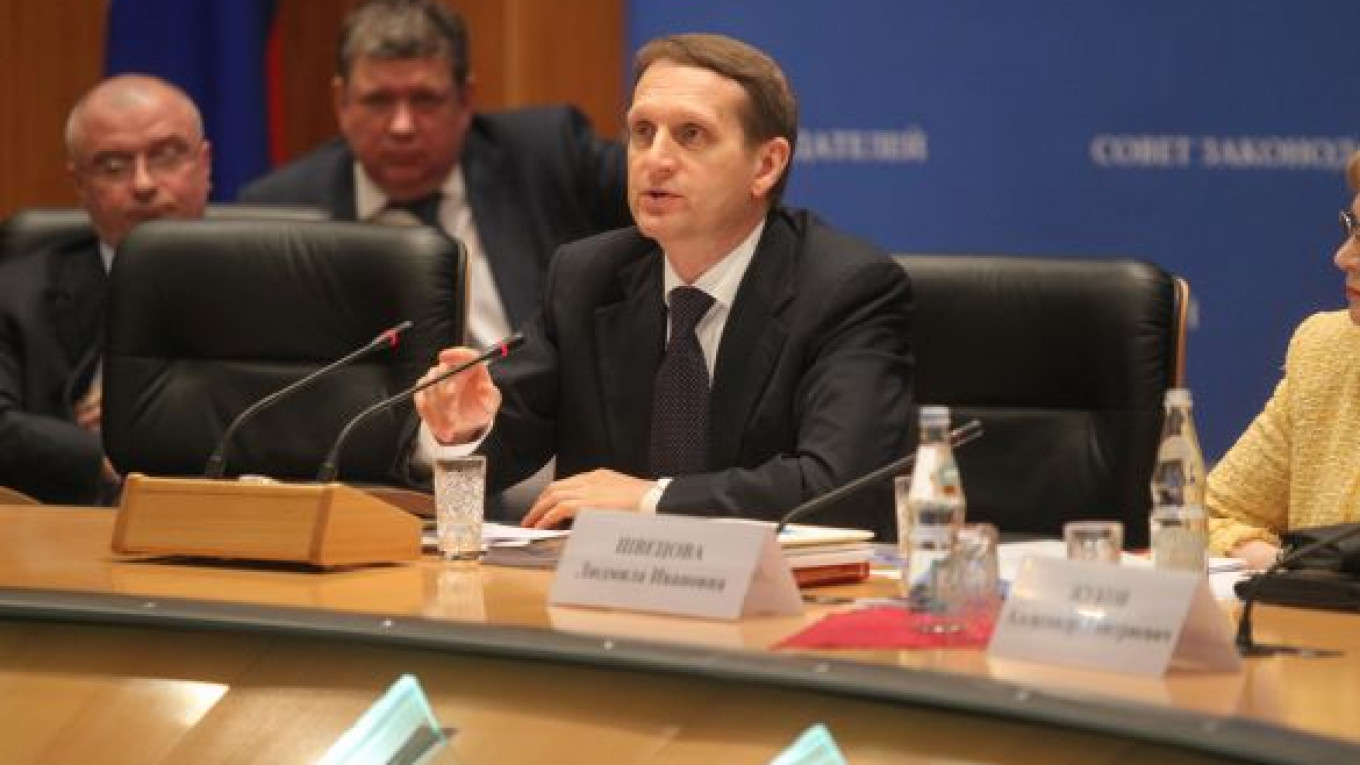The State Duma in the coming months will focus on legislation that will provide "stability" for businesses at a time of "extremely challenging" economic circumstances in Russia, Duma Speaker Sergei Naryshkin said Tuesday.
"Today, almost in every strategic direction of the country's development there are additional risks. They stem from an extremely challenging situation in the world and Russian economies," Naryshkin told lawmakers at the opening of the Duma's spring session.
In these conditions, it is important that lawmakers create laws promoting "stability, the sanctity of the 'rules of the game' [and] the possibility to forecast economic results," both for large corporations and small firms, Naryshkin said in a transcript of his speech posted on the Duma's website.
"Every economic bill should be aimed at further empowerment of entrepreneurial freedom and improving the investment climate in the country," he said.
Viktor Zvagelsky of pro-Kremlin United Russia, deputy head of the Duma's Committee for Economic Policy, Innovation Development and Entrepreneurship, wrote in an e-mail to The Moscow Times that his committee would propose two-year tax breaks for "new small enterprises working in production, social and science spheres."
Another bill drafted by the committee would simplify the procedure of paying taxes and making insurance payments for small businesses in the long term, he said.
Mikhail Yemelyanov, first deputy head of the Duma's Committee for Economic Policy, and deputy head of A Just Russia's faction, said that a "political signal has been given" to improve business the climate "but unfortunately, there are only a few such bills."
Yemelyanov named two bills that could improve the business climate: one simplifying the way small businesses get connected to the electricity grid and another that creates a procedure for appealing violations by state agencies responsible for providing land plots and construction permits to businesses.
Another bill important for the economy would introduce state "strategic planning" in social and economic spheres and the sphere of national security, which will be different, though, from the"directive planning" of the Soviet economy, Yemelyanov said.
But some deputies are skeptical. Nikolai Arefyev of the Communist Party, who is deputy head of the Duma's Committee for Economic Policy, said he saw no bills in the Duma's plan that could improve the investment climate.
On the contrary, last year the tax burden on small businesses grew twofold, which resulted in the closure of 1.8 million small businesses across Russia, Arefyev said. The increase of various excise duties last year, including on gasoline, alcohol and tobacco, also discouraged business people.
"This is all aimed at robbing both business and the populace, and pumping out their last money to plug holes in the budget," Arefyev said.
To attract investment, cheap loans and reduced taxes are needed, he said.
An inquiry sent to the spokeswoman for Duma Deputy Speaker Igor Lebedev of the Liberal Democratic Party was not answered in time for publication.
The majority of the Duma's tasks for the spring session were defined in President Vladimir Putin's state of the nation address in December, Naryshkin said.
They include expanding housing construction; countering registration of companies and placing of assets in offshore zones; developing Siberia and the Far East; and further empowering local authorities.
Just under a hundred bills are listed in the Duma's priority schedule for the session, according to its website.
Contact the author at n.krainova@imedia.ru
A Message from The Moscow Times:
Dear readers,
We are facing unprecedented challenges. Russia's Prosecutor General's Office has designated The Moscow Times as an "undesirable" organization, criminalizing our work and putting our staff at risk of prosecution. This follows our earlier unjust labeling as a "foreign agent."
These actions are direct attempts to silence independent journalism in Russia. The authorities claim our work "discredits the decisions of the Russian leadership." We see things differently: we strive to provide accurate, unbiased reporting on Russia.
We, the journalists of The Moscow Times, refuse to be silenced. But to continue our work, we need your help.
Your support, no matter how small, makes a world of difference. If you can, please support us monthly starting from just $2. It's quick to set up, and every contribution makes a significant impact.
By supporting The Moscow Times, you're defending open, independent journalism in the face of repression. Thank you for standing with us.
Remind me later.






